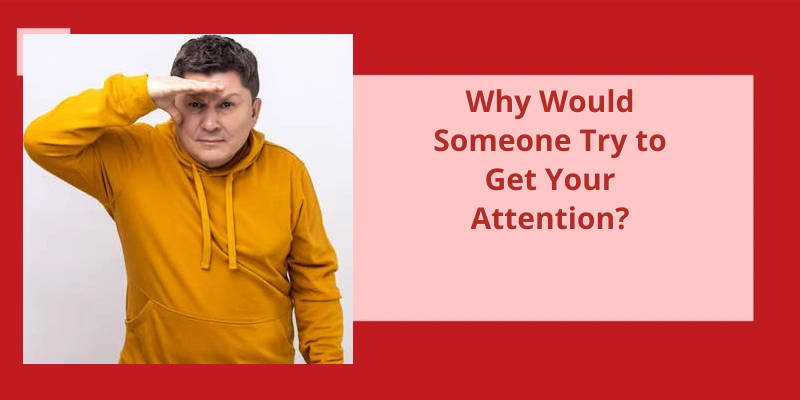In a world filled with constant distractions and competing demands for our attention, it isn’t uncommon to encounter individuals who’ll go to great lengths to capture and hold our focus. But why would someone go to such extremes to get your attention? The reasons behind this behavior can vary, but they often stem from underlying psychological factors. Jealousy, low self-esteem, loneliness, or even a personality disorder may drive individuals to seek attention in various ways. Understanding the motivations behind this behavior is crucial in identifying and addressing the root causes of attention-seeking actions. Whether it’s noticing these patterns in yourself or someone else, seeking the assistance of a mental health professional can provide invaluable insights, diagnosis, and treatment options for a more fulfilling and balanced life.
How Do I Know if Someone Is Trying to Get My Attention?
If you ever find yourself questioning whether someone is trying to get your attention, there are a few signs you can look out for. One common indicator is when an individual repeatedly seeks validation or compliments by pointing out their achievements or successes. This attention-seeking behavior often manifests in the form of fishing for compliments, as the person might be seeking external validation to boost their self-esteem.
Another way someone might try to catch your attention is by constantly seeking your approval or approval from others. They may demonstrate this by consistently seeking your opinion or seeking validation through seeking others opinions and advice. This can be a way for them to feel acknowledged and valued.
Attention seekers may also engage in overt behavior to garner attention, such as being excessively loud, performing outrageous stunts, or engaging in disruptive actions. They might go to great lengths to ensure that all eyes are on them, seeking to dominate conversations or gatherings. These individuals often thrive on being the center of attention, and their behavior can be quite noticeable.
Sometimes, someone may try to get your attention by overly exaggerating various aspects of their life or experiences. They may embellish stories or events to make them seem more interesting or significant. This can be a way for them to captivate an audience and ensure that they’ve everyones attention.
Another method of grabbing your attention is through passive-aggressive behavior. Instead of communicating their needs directly, they may engage in actions intended to provoke a response from you. This type of attention seeking is more covert, as they’re trying to elicit a specific reaction without explicitly stating their desires.
Overall, attention-seeking behavior can take many forms, and it’s essential to pay attention to the patterns and motivations behind someones actions. By recognizing these behaviors, you can better understand why someone might try to get your attention and respond accordingly.
The Role of Social Media in Attention Seeking
- The ability to share personal achievements and milestones
- A platform to gain recognition and validation from others
- An outlet for expressing opinions and seeking validation
- A tool for self-promotion and building a personal brand
- A way to connect with like-minded individuals and build networks
- An avenue for seeking attention and gaining a larger following
- A means of showcasing talents and skills
- An opportunity to participate in trending topics and discussions
- A channel for seeking advice, support, or sympathy
- A platform to create and share content that aims to capture attention
He might also try to get your attention through non-verbal cues such as maintaining eye contact, leaning in, or nodding in agreement. Furthermore, his efforts to grab your attention could extend beyond just listening attentively. He might initiate conversations, ask questions about your interests, or even go out of his way to assist you. These actions could be indications of genuine interest, as he wants to establish a connection and foster a deeper relationship with you.
Why Would a Man Try to Get Your Attention?
When a man tries to get your attention, it could be a clear indication that he’s interested in you. This can manifest in various ways, such as actively seeking opportunities to engage in conversation with you or displaying body language that signals his desire to capture your attention. By doing so, he aims to establish a connection with you and communicate his interest.
One key aspect of trying to get your attention is active listening. When a guy is genuinely interested in you, he’ll make a conscious effort to listen attentively to everything you’ve to say. This means he won’t zone out, check his phone, or engage in any other distractions. Instead, he’ll focus on the conversation and show genuine interest in what you’re saying.
In addition to verbal communication, body language also plays a crucial role in trying to get your attention. These non-verbal cues indicate that he wants to establish a connection and make you feel seen and heard.
Whether through active listening, engaging in meaningful conversations, or displaying attentive body language, his actions are aimed at demonstrating his genuine interest and making you feel valued. So, if you notice someone consistently seeking ways to catch your attention, it may be a sign that they’re interested in getting to know you better.
Signs That a Man Is Trying to Get Your Attention
When a man is trying to get your attention, there are certain signs you can look out for. One common sign is increased eye contact. If you notice a man consistently looking in your direction or making eye contact with you, it could be a sign that he’s seeking your attention.
Another sign is body language. A man who’s trying to get your attention may engage in open and inviting body language, such as facing towards you, leaning in, or mirroring your movements. This can indicate a desire to connect with you and establish a rapport.
Additionally, verbal cues can also indicate that someone is trying to capture your attention. If a man frequently initiates conversations with you or finds excuses to talk to you, it could be a sign that he’s interested in getting your attention.
Furthermore, playful teasing or flirting can also be indicative of someone’s attempt to grab your attention. This can include making lighthearted jokes, giving compliments, or finding ways to make you laugh. These actions can signal a man’s interest in piquing your interest and creating a connection.
Overall, when a man is trying to get your attention, it’s important to pay attention to his behavior, body language, and verbal cues. By being observant of these signs, you can better understand if someone is seeking your attention and determine how you’d like to respond.
As social creatures, humans naturally crave attention and connection with others. However, attention-seeking behaviors in adults can stem from deeper issues such as low self-esteem and loneliness. Seeking attention can serve as a means to find validation and establish meaningful connections with others, especially when one’s daily life lacks sufficient social interaction. Indeed, attention from others plays a crucial role in supporting our overall well-being. Hence, understanding why someone might seek attention can shed light on the underlying motivations behind their behavior.
Why Someone Wants Your Attention?
Attention-seeking behavior can manifest in various ways, such as constantly seeking validation, exaggerating achievements, or creating unnecessary drama. In some cases, individuals may resort to desperate measures, such as outrageous acts or extreme emotional displays, to grab someones attention. This can be a result of feeling invisible or insignificant in their normal day-to-day interactions.
Low self-esteem is a common underlying factor driving attention-seeking behaviors. Those who struggle with their self-worth often seek external validation and reassurance from others. By eliciting attention, they hope to receive positive feedback that boosts their self-esteem and momentarily alleviates their insecurities.
Loneliness can also play a significant role in the desire for attention. People who feel isolated or lacking strong connections may resort to attention-seeking strategies in an attempt to establish meaningful relationships or feel a sense of belonging. By attracting attention, they hope to initiate interactions and form connections that fulfill their emotional needs.
Ultimately, understanding why someone seeks attention is a complex endeavor that can vary from person to person. It may be rooted in their individual experiences, personal insecurities, or a combination of factors. By acknowledging the underlying needs driving attention-seeking behaviors, we can approach these individuals with empathy and compassion, helping foster healthier ways of seeking connection and support.
They might subtly follow you on social media platforms or make an effort to strike up conversations with you whenever possible. Additionally, their body language and nonverbal cues may also reveal their desire for your attention. By paying close attention to these signs, you can gain insight into whether or not your crush wants your attention.
How Do You Know if Your Crush Wants Your Attention?
How do you know if your crush wants your attention? Theyre constantly close by. If you notice that your crush is always around you — frequenting your favorite hang out spots or attending all the same social events as you — it might be because theyre romantically interested in you and trying to get your attention. People often go out of their way to be near someone theyre interested in, hoping to catch their eye or strike up a conversation.
Another way to tell if your crush is seeking your attention is through their body language. Pay close attention to their actions when youre around. Do they try to make eye contact with you often or find excuses to touch you? These could be indicators that theyre trying to establish a connection with you and get your attention.
Additionally, your crush might be trying to get your attention by engaging with you on social media. Do they frequently like, comment, or share your posts? Do they initiate conversations or slide into your DMs? These are all signs that theyre actively seeking your attention and trying to cultivate a connection online.
Furthermore, your crush might go out of their way to make you laugh or show off their skills and talents when youre around. They might crack jokes, perform impressive feats, or share interesting stories to catch your attention and make you notice them. By putting in this extra effort to entertain and impress you, theyre trying to stand out from the crowd and make you take notice of them.
Lastly, your crush might try to get your attention by finding reasons to start conversations with you. They might ask for your opinion, seek your advice, or simply strike up casual small talk. By initiating these interactions, theyre hoping to create opportunities for a deeper connection and demonstrate their interest in getting to know you better.
Another way to gauge someone’s interest in you is by observing their behavior for attention-seeking actions. Individuals who genuinely like you might exhibit certain behaviors to grab your attention. For instance, they might talk louder when you’re nearby or purposefully engage in laughter with their friends when you’re around. While they may not directly initiate conversations on social media, they may show their interest by frequently liking or engaging with your online posts.
How Do You Know if Someone Likes You or Just Likes the Attention?
Figuring out whether someones interest in you stems from genuine affection or simply a desire for attention can be quite challenging. One way to discern their true intentions is by observing how they seek out attention. If a person genuinely likes you, they might engage in behaviors to grab your notice. For instance, they might intentionally raise their voice when youre nearby or laugh more loudly in the presence of their friends when youre around. These actions indicate a conscious effort to draw your attention and suggest their interest in you.
Additionally, pay attention to their online behavior. While they may not directly approach you on social media, they may subtly show their interest in you by consistently liking and interacting with your posts. By actively engaging with your online presence, they’re subtly conveying their desire to stay connected and seize your attention. However, it’s essential to remember that these interactions alone may not signify genuine affection but rather a craving for attention.
Another clue to decipher someones true intentions lies in their communication patterns. Someone who genuinely likes you is likely to initiate conversations, inquire about your day, and show a genuine interest in your life. On the other hand, someone who primarily seeks attention may only reach out when they need validation or seek compliments. Their conversations may revolve around themselves, subtly redirecting the attention back to them instead of reciprocating interest in you.
Furthermore, pay attention to their body language when you’re together. Genuine interest is often reflected in subtle cues such as maintaining eye contact, leaning in closer when you speak, or mirroring your gestures and expressions. These nonverbal signals are indicative of a genuine connection and an earnest desire to establish a deeper bond. Conversely, if their body language seems distant or their attention is easily diverted elsewhere, it may suggest that they’re merely seeking attention rather than truly liking you.
Finally, it’s crucial to trust your intuition when it comes to deciphering someones intentions. Our instincts tend to pick up on subtle cues and subtle shifts in behavior that may not be easily discernible. If something feels off or inconsistent, it’s worth considering whether the persons actions align with genuine affection or if they’re primarily driven by a desire for attention.
Red Flags That Indicate Someone Is Using You for Attention
- They always seem to contact you when they need something.
- They only reach out when they’ve something to brag about or show off.
- They constantly seek validation and compliments from you.
- They rarely show genuine interest or concern for your well-being.
- They frequently cancel plans or prioritize other people over you.
- They often interrupt or divert conversations back to themselves.
- They only engage with you on social media for public display.
- They consistently disregard your boundaries and personal needs.
- They rarely reciprocate efforts or gestures of kindness.
- They frequently exploit your skills or resources without offering anything in return.
- They often make you feel guilty or obligated to cater to their demands.
- They rarely acknowledge or appreciate your accomplishments or successes.
- They frequently resort to manipulation or emotional blackmail to get attention.
- They consistently place their needs and wants above yours in any given situation.
- They rarely take responsibility for their actions or apologize for their behavior.
- They frequently engage in attention-seeking behaviors that disregard your feelings.
- They consistently prioritize maintaining a large social circle over building a genuine connection with you.
- They often make you feel insecure or inadequate in comparison to their other relationships.
- They rarely invest time or effort into nurturing the friendship or relationship.
- They frequently exhibit inconsistent or unpredictable behavior, leaving you feeling confused and uncertain.
Source: 4 Ways to Know when Someone Likes You – wikiHow
Conclusion
It’s essential to recognize these behaviors not only in others but also in ourselves. Seeking the help of a mental health professional who can provide a proper diagnosis and treatment options is crucial in understanding and addressing these attention-seeking patterns. By doing so, one can work towards developing healthier ways of seeking validation and fulfillment, ultimately leading to improved mental well-being and more fulfilling relationships.






